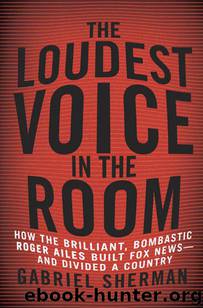The Loudest Voice in the Room: How the Brilliant, Bombastic Roger Ailes Built Fox News--and Divided a Country by Sherman Gabriel

Author:Sherman, Gabriel [Sherman, Gabriel]
Language: eng
Format: epub, azw3, mobi
ISBN: 9780679644095
Publisher: Random House Publishing Group
Published: 2014-01-14T06:00:00+00:00
As the administration rolled out its sales pitch for the war, Ailes installed a new head of daytime programming to package the production, promoting Jerry Burke, the producer of Shepard Smith’s nightly newscast. Burke expressed a tabloid editor’s thrill for the biggest story of a generation. Not long after 9/11, John Moody offered him the position overseeing the 9:00 a.m.–4:00 p.m. news block.
“Will you keep the car on the road or will you crash it?” Moody said.
“I want to see how fast it can go,” Burke told him.
Fox’s raucous cheerleading disguised the fact that, on a complex story like international terrorism, the channel was at a distinct disadvantage against its rivals. At the time, Fox News had just 1,200 employees and six foreign bureaus. CNN, in contrast, employed 4,000 people and had thirty-one international bureaus. When the war in Afghanistan started, Fox had no one on the ground, while CNN had a correspondent in the country. Although MSNBC was struggling to develop an identity, it still had the robust newsgathering assets of NBC News to fall back on.
So Burke improvised. Shortly after receiving the promotion, he teamed up with two staffers on the assignment desk—David Rhodes and Eric Spinato—to develop a flanking maneuver designed to pick away viewers from their better-funded rivals. They called it “Operation Rolling Thunder.” CNN may have been the entrenched opposition, but Fox News would cover the story in a way that would be irresistible to viewers. Terrorism would become serial entertainment. “Fox approached news differently,” a staffer who had done time at other networks said. “It wasn’t actual journalism where you say, ‘Let’s go see what’s going on.’ At Fox, it’s ‘This is what we’re doing, so go do it.’ ”
Every morning, Burke got off the commuter train at Penn Station determined to inflict damage on the competition. He told people that producing news was like scanning a searchlight across the horizon to hunt for the right story. His first read of the day was the Drudge Report, not The New York Times. Whatever items seemed to be generating heat on the right were fodder for the air. Conflict was good. Too much conflict was bad. After an interview with a Muslim guest devolved into a shouting match, Burke hollered across the newsroom, “I need a better Muslim!” He was adept at convincing angry subjects to keep coming back. He cajoled another prominent Muslim guest to back off on his threat to boycott Fox after one particularly harsh interview. “Why would I come on to have someone say I’m a child murderer?” he told Burke.
“You’re doing a service, you’re getting your message across,” Burke replied. He also told him that, at the end of the day, it was just television. “You need to lighten up.”
Fox News promoted the buildup to war like a pregame show. Anchors played the role of announcers, championing the home team: America. George Bush was the star quarterback, carrying the hopes of an expectant fan base on his shoulders. On-air, troops were “heroes” and “warriors.
Download
The Loudest Voice in the Room: How the Brilliant, Bombastic Roger Ailes Built Fox News--and Divided a Country by Sherman Gabriel.azw3
The Loudest Voice in the Room: How the Brilliant, Bombastic Roger Ailes Built Fox News--and Divided a Country by Sherman Gabriel.mobi
This site does not store any files on its server. We only index and link to content provided by other sites. Please contact the content providers to delete copyright contents if any and email us, we'll remove relevant links or contents immediately.
Hit Refresh by Satya Nadella(9137)
When Breath Becomes Air by Paul Kalanithi(8447)
The Girl Without a Voice by Casey Watson(7889)
A Court of Wings and Ruin by Sarah J. Maas(7847)
Do No Harm Stories of Life, Death and Brain Surgery by Henry Marsh(6941)
Shoe Dog by Phil Knight(5269)
The Rules Do Not Apply by Ariel Levy(4970)
A Higher Loyalty: Truth, Lies, and Leadership by James Comey(4964)
Hunger by Roxane Gay(4928)
Tuesdays with Morrie by Mitch Albom(4784)
Everything Happens for a Reason by Kate Bowler(4743)
The Immortal Life of Henrietta Lacks by Rebecca Skloot(4588)
Millionaire: The Philanderer, Gambler, and Duelist Who Invented Modern Finance by Janet Gleeson(4478)
How to Change Your Mind by Michael Pollan(4357)
All Creatures Great and Small by James Herriot(4322)
The Money Culture by Michael Lewis(4207)
Man and His Symbols by Carl Gustav Jung(4137)
Elon Musk by Ashlee Vance(4128)
Tokyo Vice: An American Reporter on the Police Beat in Japan by Jake Adelstein(3996)
